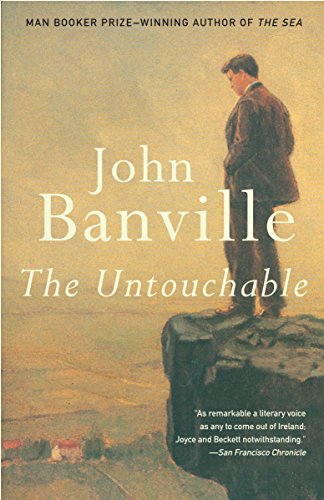Banville is a wordsmith of first rank, his sentences thoroughly crafted. This is so especially when he is writing - as he seems to do - through the eyes of a painter, or art aficionado.
John Banville has quietly been having one of the great literary careers of our time, and “The Untouchable” is perhaps his best work. Inspired by the peculiar case of Sir Anthony Blunt, who managed the British royal family’s art collection while betraying Britain’s deepest secrets to the Soviet Union, Banville’s book imagines the conflicted inner life of a fictional aesthete-traitor.
If you want to lose yourself into a book for a while and if you love to feel beautiful prose pass over your tongue in a pleasant manner then this is the book. I loved it so much and now am working my way through all of his books.
This novel is based on the life of upper class English art historian, Sir Anthony Blunt, who managed to be the curator of Her Majesty's pictures at the same time as being a Stalinist spy.I have never really figured out how important people like Blunt, Philby, Burgess and Maclean etc.
An intriguing account of the Cambridge spies. Interesting, amusing and somewhat impertinent, it makes the entire pre-World War II and Cold War era of intrigue seem little more than a playground for the privileged; spying as a cure for boredom and socialism as a lofty objective, albeit somewhere deep in the horizon and far from their extravagant lifestyles.
For a book that is presented as a fictionalized version of actual events, "The Untouchable" is slanted and dishonest in many unnecessary ways, from large to small. For example: from portraying Leo Rothenstein, Banville's surrogate for Baron Victor Rothschild, as one of the spies when Rothschild was, in fact, a patriotic war hero, to calling him a "boogie-woogie" piano player when he was, in fact, a student of Teddy Wilson, who was not a boogie-woogie piano player.
This book, by the marvellous John Banville, is so well written that I did something I have never done before in all my long years of reading and teaching: I finished the book and turned back to the beginning and reread it. It was such a finely tuned novel, with so much to savor, I did not feel I had fully (or even barely) appreciated Banville's style and diction while I was moving through the plot the first time.
As most readers will already know, this is a fictionalized account of the life Anthony Blunt, one of the "Cambridge Five," who spied for the Soviet Union. The book was highly recommended to me by friends who loved Banville's use of language, but while I found some of his turns of phrase to be insightful and novel, I don't think that's sufficient to carry a 360 page book.
If you want to read about a self-centered main character with no redeeming qualities, this is your book. If you want to read something that inspires you or teaches you something of value, this is not your book.
As it turns out, spying and hiding in plain sight aren't all that far apart. Victor Maskell is many things, a spy, a traitor, an art critic, a father and husband and queer, but the one thing he never really was over the years was found out.
As also in later works, here (in 1997), Banville cast a late middle-aged male in a state of reminiscence, so there are then and now figures at a centre of one man's life story. Some research apparently went into depicting the elite British double agents of the 30s and 40s, of the public schools (reviewers have pointed to Anthony Blunt and others), but nothing much happens in the way of espionage in this account, so comparisons to le Carre don't make sense, and the supposed shock of exposure is here rather underwhelming.
Freddie Montgomery, the central character of John Banville's The Book Of Evidence, is an apparently complex man. The word `apparently' is important because he has a tendency to cloak really quite simple actions in complex, sometimes convoluted narrative.
The first 100+ pages of TU I adored. I was completely swept up in the memoiristic musings of the protagonist.
A witty, insightful view of a famous spy for the Soviets in Britain. Sometimes hard to follow the roles of all the characters.
Better than his novella THE SEA for which he won the recent Man Booker Prize, THE UNTOUCHABLE is almost the perfect novel by which John Banville could display his unique talents, in that it provides a thinkly disguised fictional portrait of Sir Anthony Blunt, the so-called "Fourth Man" of the Cambridge spy ring. Blunt's background as the head of the Courtauld Institute and as a leading expert on Poussin (and Purveyor of the Queen's Pictures) makes him as suitable a subject for Banville as does his conflicted ethical choices and crimes.
